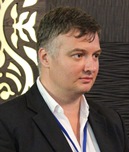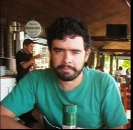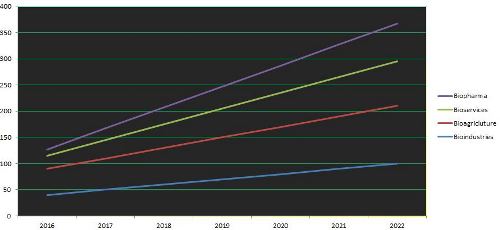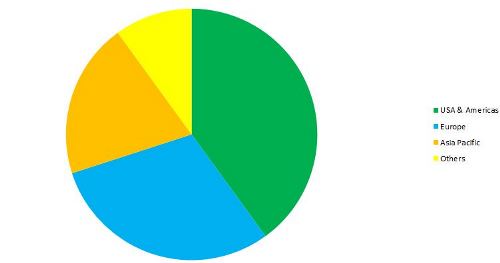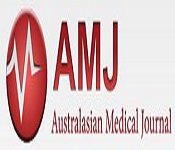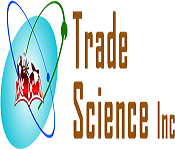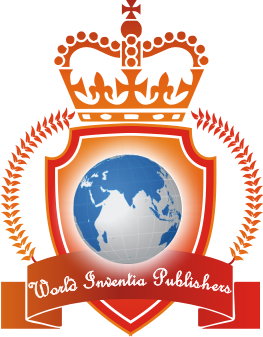Theme: Acquire Innovative Strategies in Biotechnology with Evolving Evidence and New Technologies
World Biotechnology 2018
Conference Series LLC LTD invites you to find a path to carve out a near-to-perfect platform where people like you and us can get together, stand together and discuss the possibilities in the field of Biotechnology and its related aspects.
World Biotechnology 2018 has been finalized to take place during December 03-04, 2018 in Sao Paulo, Brazil and will initiate its journey towards its aim of unifying people from different corners around the globe with the theme “Acquire Innovative Strategies in Biotechnology with Evolving Evidence and New Technologies”.
As the premier event, we have developed a program with your interests in mind. We have not only increased the number of opportunities for you to network with colleagues from across the world but also introduced more focused sessions that will feature cutting edge presentations, special panel discussions, and livelier interaction with industry leaders and experts.
Attend World Biotechnology 2018 to network with your peers, exchange expertise and experiences, and arm yourself with the latest information to take your department to the next level of development.
Come and join this felicitous event in Sao Paulo and support us in making the Conference a huge success.
World Biotechnology Congress 2018:
Conference Series LLC Ltd welcomes you to attend the “3rd World Biotechnology Congress (World Biotechnology 2018)” scheduled during December 03-04, 2018 at Sao Paulo, Brazil. The relative innovative nature of the conference is to bring the encroachment in the field of Biotechnology and its related aspects.
We warmly invite all the participants interested in sharing their knowledge and research in the area of Biotechnology and its related fields.
The success of the previous conference "2nd Word Biotechnology Congress Sao Paulo, Brazil" has given us the prospect to bring the gathering one more time.
World Biotechnology Congress 2018 will lay a platform for making a good network with researchers and scholars from both academia and industry from all six continents and aims to accelerate scientific discoveries and major milestones in World Biotechnology Congress 2018 with a theme “Acquire Innovative Strategies in Biotechnology with Evolving Evidence and New Technologies”.
Scope:
“World Biotechnology Congress: Sao Paulo, Brazil” is the amalgamation of new technologies in the area of Biotechnology & its related aspects to help business professionals tie together the full potential of their practice. It involves the use of tools and technologies which helps to achieve a certain degree of publicity and expand the reach of the practice and the practitioner. The conference brings a remarkable opportunity for all individuals of the scientific field to upgrade their know-how of the latest technologies & strategies.
Why to attend World Biotechnology Congress 2018?
Biotechnology Conferences from Conference Series LLC Ltd has been oriented with twofold objectives in mind. The theme of the conference is “Acquire Innovative Strategies in Biotechnology with Evolving Evidence and New Technologies” which covers a wide range of critically important sessions.
The event enterprises at bringing the advancement in the field of Biotechnology, Genetics Engineering, Pharmacy, Biological sciences and allied groups and also lays a special emphasis at Educating and informing researcher with the latest knowledge so that it can be applied to counter the commercial under-evaluation chemists and biologists may face in their practice.
Crux of this World Biotechnology 2018:
World Biotechnology Congress 2018, which is going to be held in Sao Paulo, Brazil during December 03rd to 04th, will be the meeting stage to address many ongoing topics in the fields related to Biotechnology, Molecular Biology, and Genetics. From Experts in these fields to students who are interested in exploring and discuss ongoing research aspects can attend this Biotechnology Conference, you can utilize this opportunity to interact with peers in your field to gain and share knowledge.
Why Sao Paulo, Brazil?
Sao Paulo, Brazil: The Biotechnology Centre. The venue of the event has been designated after much analysis to assure that the event is being held in one among the hotspots for the involved field, thus attending is predicted to be astounding, each in quality and amount. The variability of approaching audience includes: figures of academic excellence, interested industrialists, students, exhibitors and eminent faces from the world of marketing therefore aiding the sponsors a unique chance to choose on from a pool of outstanding scopes for broadening of their business, new project venture and action. Of those influences combined and variety of alternative lots of build “World Biotechnology Congress 2018” a “must attend” conference.
Target Audience for this Biotechnology Meeting:
- Biotechnology associations
- Genetic Engineering associations
- Biotechnology and Bio Pharmaceutical Industries
- Biotechnology researchers
- Business entrepreneurs
- Biological science academia’s
- Food and Nutrition researchers
- Ecologists
- Bioengineers
Details of Biotechnology Conferences 2018 in Brazil:
Conference Series LLC Ltd is organizing Biotechnology Conferences in 2018 at Sao Paulo, Brazil. We organize Biotechnology Meetings in the fields related to Plant & Agriculture Biotechnology, Food Safety & Security, Environment Biotechnology, Animal Biotechnology, Genetic & Tissue science Engineering, Molecular Biology, Nano Biotechnology, Biofuels, Bioenergy & Bio economy, Cell Science & Cell Biology, Pharmaceutical Biotechnology, Applied Biotechnology, Biomedical Engineering, Bioinformatics & System Biology, Gene Editing by CRISPR/CAS 9 Technology and Industrial Biotechnology.
|
Conference Name |
Place |
Date |
|
Sao Paulo, Brazil |
Dec 03-04, 2018 |
Track 1: Agricultural Biotechnology
Agricultural biotechnology is a part of agricultural science involving the utilization of scientific tools and techniques, includes genetic engineering, molecular markers, molecular diagnostics, vaccines, and tissue culture, to modify living organisms: plants, animals, and microorganisms. Crop biotechnology is one aspect of agricultural biotechnology that has been greatly developed upon in recent times. Desired traits are exported from a specific species of Crop to an entirely different species. These transgene crops possess fascinating characteristics in terms of flavor, color of flowers, growth rate, size of harvested products and resistance to diseases and pests.
Related Conferences
10th World Congress and Expo on Cell & Stem Cell Research, March 19-21, 2018 New York, USA; 9th International Conference and Exhibition on Tissue Engineering and Biobanking, April 23-24, 2018 Las Vegas, Nevada, USA; 9th International Conference & Exhibition on Tissue Science & Regenerative Medicine, April 23-24, 2018 Las Vegas, Nevada, USA; 11th Annual Conference on Stem Cell and Regenerative Medicine, July 19-20, 2018 Dubai, UAE; 12th International Conference on Tissue Engineering and Regenerative Medicine, November 9-10, 2018 Atlanta, Georgia, USA; 2nd Annual summit on Cell Metabolism and Cytopathology, September 19 - 20, 2018 Philadelphia, Pennsylvania, USA; 2nd Annual summit on Cell Signaling and Cancer Therapy, September 19 - 20, 2018 Philadelphia, Pennsylvania, USA
Track 2: Plant Biotechnology
Plant biotechnology is also known as plant breeding, it is the art and science of modifying the traits of plants to produce desired characteristics. It’s been accustomed to improve the standard of nutrition in merchandise for humans and animals. Plant breeding can be accomplished through many alternative techniques ranging from simply selecting plants with desirable characteristics for propagation, to methods that make use of knowledge of genetics and chromosomes, to more complex molecular techniques. Genes in a plant are determining the type of qualitative or quantitative traits it will have. The main purpose plant breeders are they can create a specific outcome of plants and potentially new plant varieties. International development nation agencies believe that breeding new crops is important for ensuring food security by developing new varieties that square measure higher-yielding, disease resistant, drought-resistant or regionally custom made to totally different environments and growing conditions.
Related Conferences
5th International Conference on Human Genetics and Genetic Disorders, September 21-22,2018 Philadelphia, Pennsylvania, USA; 11th International Conference on Genomics and Pharmacogenomics, September 21-22, 2018 Philadelphia, Pennsylvania, USA; Annual Congress on Cellular Therapies, Stem Cells and Bio Medical Engineering, October 19-20, 2018, Baltimore, Maryland, USA; 24th Biotechnology Congress: Research & Innovations, October 24-25, 2018 Boston, USA; Annual Conference on Biomaterials for Bone Tissue Engineering, October 18-19, 2018 Dubai, UAE; International Congress & Expo on Genomics and Bioinformatics, November 2-3, 2018, Columbus, Ohio, USA; 12th International Conference & Exhibition on Tissue Preservation and Biobanking, November 9-10, 2018 Atlanta, Georgia, USA
Track 3: Environment Biotechnology
Environmental biotechnology is applied and used to study the natural environment. Environmental biotechnology could also implement to harness biological process for Industrial uses and exploitation. The International Society for Environmental Biotechnology defines environmental biotechnology as "the development, use and regulation of biological systems for remediation of contaminated environments (such as land, air, water) and for eco-friendly processes (green manufacturing technologies and sustainable development)". Environmental biotechnology can simply be described as "the optimal use of nature, in the form of plants, animals, bacteria, fungi and algae, to produce renewable energy, food and nutrients in a synergistic integrated cycle of profit making processes where the waste of each process becomes the feedstock for another process".
Related conferences
Annual Congress on Cellular Therapies, Stem Cells and Bio Medical Engineering, October 19-20, 2018, Baltimore, Maryland, USA; 24th Biotechnology Congress: Research & Innovations, October 24-25, 2018 Boston, USA; Annual Conference on Biomaterials for Bone Tissue Engineering, October 18-19, 2018 Dubai, UAE; International Congress & Expo on Genomics and Bioinformatics, November 2-3, 2018, Columbus, Ohio, USA; 12th International Conference & Exhibition on Tissue Preservation and Biobanking, November 9-10, 2018 Atlanta, Georgia, USA; 2nd Annual Summit on Cell Therapy and Stem Cell Research, November 9-10, 2018 Atlanta, Georgia, USA; Annual Industrial Biotechnology and Bioprocessing Congress, September 17-18, 2018 San Diego, California, USA; Annual Congress on CRISPR-Cas9 Technology, October 24-25, 2018 Boston, USA; Annual Biotechnology Congress, July 23-24, 2018 Vancouver, Canada
Track 4: Food Processing safety and Technology
Food biotechnology is the application of technology to modify genes of animals, plants, and microorganisms to create new species which have desired production, marketing, or nutrition related properties. Genetically engineered (GE) or genetically modified (GM) foods, they are a source of an unresolved controversy over the uncertainty of their long-term effects on humans and food chains. Food biotechnology is and will continue to be an important area in science as the world’s human population continues to increase and the world’s agricultural lands continue to decrease. Food biotechnology employs the tools of modern genetics to enhance beneficial traits of plants, animals, and microorganisms for food production. It involves adding or extracting select genes to achieve desired traits. Food biotechnology offers the potential to further improve our nation’s health and the health of developing nations. The work currently being done with “golden rice” and the potential it has to help combat hunger and malnutrition related diseases. Purchase fruits and vegetables with increased antioxidant content that may reduce risk for cancer. Plant-made pharmaceuticals are the latest evolution within the realm of biotechnology. As the name suggests, this process uses genetics to enable plants to produce protein-based medicines to treat diseases and save lives. These proteins are extracted from the plant and developed into pharmaceuticals. Edible vaccines are among the most innovative approaches for administering new vaccines. For example, researchers have investigated putting a vaccine into bananas that would protect against food borne pathogens.
Related Conferences
10th World Congress and Expo on Cell & Stem Cell Research, March 19-21, 2018 New York, USA; 9th International Conference and Exhibition on Tissue Engineering and Biobanking, April 23-24, 2018 Las Vegas, Nevada, USA; 9th International Conference & Exhibition on Tissue Science & Regenerative Medicine, April 23-24, 2018 Las Vegas, Nevada, USA; 11th Annual Conference on Stem Cell and Regenerative Medicine, July 19-20, 2018 Dubai, UAE; 12th International Conference on Tissue Engineering and Regenerative Medicine, November 9-10, 2018 Atlanta, Georgia, USA; 2nd Annual summit on Cell Metabolism and Cytopathology, September 19 - 20, 2018 Philadelphia, Pennsylvania, USA; 2nd Annual summit on Cell Signaling and Cancer Therapy, September 19 - 20, 2018 Philadelphia, Pennsylvania, USA
Track 5: Animal Biotechnology
Animal biotechnology is a branch of biotechnology in which molecular biology techniques are used to genetically engineer (i.e. modify the genome of) animals in order to improve their suitability for pharmaceutical, agricultural or industrial applications. Animal biotechnology has been used to produce genetically modified animals that synthesize therapeutic proteins, have improved growth rates or are resistant to disease. Animal health and efficiency in generating animal based products with a target to increase quantity as well as quality of such products is the ultimate motive behind scientific research. Animal biotechnology is the use of science and engineering to modify living organisms. The goal is to make products, to improve animals and to develop microorganisms for specific agricultural uses. Examples of animal biotechnology include creating transgenic animals (animals with one or more genes introduced by human intervention), using gene knock out technology to make animals with a specific inactivated gene and producing nearly identical animals by somatic cell nuclear transfer (or cloning). Animal biotechnology in use today is based on the science of genetic engineering. Under the umbrella of genetic engineering exist other technologies, such as transgenics and cloning, that also are used in animal biotechnology. The potential benefits of animal biotechnology are numerous and include enhanced nutritional content of food for human consumption; a more abundant, cheaper and varied food supply; agricultural land-use savings; a decrease in the number of animals needed for the food supply; improved health of animals and humans; development of new, low-cost disease treatments for humans; and increased understanding of human disease.
Related Conferences
5th International Conference on Human Genetics and Genetic Disorders, September 21-22,2018 Philadelphia, Pennsylvania, USA; 11th International Conference on Genomics and Pharmacogenomics, September 21-22, 2018 Philadelphia, Pennsylvania, USA; Annual Congress on Cellular Therapies, Stem Cells and Bio Medical Engineering, October 19-20, 2018, Baltimore, Maryland, USA; 24th Biotechnology Congress: Research & Innovations, October 24-25, 2018 Boston, USA; Annual Conference on Biomaterials for Bone Tissue Engineering, October 18-19, 2018 Dubai, UAE; International Congress & Expo on Genomics and Bioinformatics, November 2-3, 2018, Columbus, Ohio, USA; 12th International Conference & Exhibition on Tissue Preservation and Biobanking, November 9-10, 2018 Atlanta, Georgia, USA
Track 6: Pharmaceutical Biotechnology
Pharmaceutical biotechnology is a comparatively new and growing field in which the principles of biotechnology are applied to the designing and production of drugs. Pharmaceutical companies manufacture and market drugs, livestock feed supplements, vitamins, and a host of other products. Consistently, Pharmaceutical companies are one of the most profitable industries in the U.S. with sales exceeding $320 billion per year. The Biotechnology industry uses modern technologies in genetics research to develop products for human diseases, includes companies engaged in drug discovery and research, production and biologically engineered food production. Biotech opportunities largely mirror those in the pharmaceutical industry yet this industry is still in its infancy stage developmentally. A majority of therapeutic drugs in the current market are bio formulations, such as antibodies, nucleic acid products and vaccines. Such bio formulations are developed through several stages that include: understanding the principles involved in health and disease; the fundamental molecular mechanisms governing the function of related biomolecules; production and purification of the molecules; determining the product shelf life, stability, toxicity and immunogenicity; drug delivery systems; patenting; and clinical trials. The future of bio-pharmaceuticals belongs to protein based therapeutics. Designing stable and effective therapeutic proteins requires knowledge of protein structure and the interactions that stabilize the structure necessary for function.
Related conferences
Annual Congress on Cellular Therapies, Stem Cells and Bio Medical Engineering, October 19-20, 2018, Baltimore, Maryland, USA; 24th Biotechnology Congress: Research & Innovations, October 24-25, 2018 Boston, USA; Annual Conference on Biomaterials for Bone Tissue Engineering, October 18-19, 2018 Dubai, UAE; International Congress & Expo on Genomics and Bioinformatics, November 2-3, 2018, Columbus, Ohio, USA; 12th International Conference & Exhibition on Tissue Preservation and Biobanking, November 9-10, 2018 Atlanta, Georgia, USA; 2nd Annual Summit on Cell Therapy and Stem Cell Research, November 9-10, 2018 Atlanta, Georgia, USA; Annual Industrial Biotechnology and Bioprocessing Congress, September 17-18, 2018 San Diego, California, USA; Annual Congress on CRISPR-Cas9 Technology, October 24-25, 2018 Boston, USA; Annual Biotechnology Congress, July 23-24, 2018 Vancouver, Canada
Track 7: Cell science and Cell Biology
Cell biology is a branch of biology that studies the different structures and functions of the cell and focuses mainly on the idea of the cell as the basic unit of life. Cell biology explains the structure, organization of the organelles they contain, their physiological properties, metabolic processes, Signaling pathways, life cycle, and interactions with their environment. This is done both on a microscopic and molecular level as it encompasses prokaryotic cells and eukaryotic cells. Knowing the components of cells and how cells work is fundamental to all biological sciences; it is also essential for research in bio-medical fields such as cancer, and other diseases. Research in cell biology is closely related to genetics, biochemistry, molecular biology, immunology, and developmental biology.
Related Conferences
10th World Congress and Expo on Cell & Stem Cell Research, March 19-21, 2018 New York, USA; 9th International Conference and Exhibition on Tissue Engineering and Biobanking, April 23-24, 2018 Las Vegas, Nevada, USA; 9th International Conference & Exhibition on Tissue Science & Regenerative Medicine, April 23-24, 2018 Las Vegas, Nevada, USA; 11th Annual Conference on Stem Cell and Regenerative Medicine, July 19-20, 2018 Dubai, UAE; 12th International Conference on Tissue Engineering and Regenerative Medicine, November 9-10, 2018 Atlanta, Georgia, USA; 2nd Annual summit on Cell Metabolism and Cytopathology, September 19 - 20, 2018 Philadelphia, Pennsylvania, USA; 2nd Annual summit on Cell Signaling and Cancer Therapy, September 19 - 20, 2018 Philadelphia, Pennsylvania, USA
Track 8: Applied Biotechnology
The applied biotechnology major deals with the scientific background and laboratory experience necessary for the biotechnology and pharmaceutical industries, or for advanced study in the applications of biotechnology and molecular biology for the use and improvement of plants, animals, and micro-organisms. In addition, it can be to prepare for professional programs in medicine. Multi discipline science of interest in chemistry, biotechnology, microbiology. This interdisciplinary major brings together areas of study such as animals, food science, forestry, entomology, and plants to improve the knowledge and skills necessary to use biotechnology for the improvement of plants, animals, and microorganisms. Gaining theoretical as well as hands-on knowledge in the areas of molecular biology, structural biology and biotechnology furthermore, studies in the areas of protein engineering, synthetic biology and molecular biotechnology for renewable energy. Thanks to the courses in project management, marketing and entrepreneurship, one will also gain insight into business management and learn how projects are planned and carried out in the biotechnology industry.
Related Conferences
5th International Conference on Human Genetics and Genetic Disorders, September 21-22,2018 Philadelphia, Pennsylvania, USA; 11th International Conference on Genomics and Pharmacogenomics, September 21-22, 2018 Philadelphia, Pennsylvania, USA; Annual Congress on Cellular Therapies, Stem Cells and Bio Medical Engineering, October 19-20, 2018, Baltimore, Maryland, USA; 24th Biotechnology Congress: Research & Innovations, October 24-25, 2018 Boston, USA; Annual Conference on Biomaterials for Bone Tissue Engineering, October 18-19, 2018 Dubai, UAE; International Congress & Expo on Genomics and Bioinformatics, November 2-3, 2018, Columbus, Ohio, USA; 12th International Conference & Exhibition on Tissue Preservation and Biobanking, November 9-10, 2018 Atlanta, Georgia, USA
Track 9: Tissue science engineering and Genetic Engineering
Genetic engineering is the manipulation of an organism's genome using biotechnology Principles. It is a set of technologies used to change the genetic makeup of cells, including the transfer of genes within and across species domains for the production of improved or novel organisms. Genetic engineering has applications in medicine, research, industry and agriculture and can be used on a wide range of plants, animals and microorganisms. Tissue engineering is the use of an integration of cells, engineering and materials principles, and suitable biochemical and physicochemical factors to improve or replace biological tissues. It involves the use of a scaffold for the formation of new viable tissue for a medical purpose. Tissue engineering covers a broad range of applications, that repair or replace portions of or whole tissues (i.e., bone, cartilage, blood vessels, bladder, skin, muscle etc.). The definition of regenerative medicine is often used same sense with tissue engineering, although those involved in regenerative medicine place more emphasis on the use of stem cells or progenitor cells to produce tissues.
Related conferences
Annual Congress on Cellular Therapies, Stem Cells and Bio Medical Engineering, October 19-20, 2018, Baltimore, Maryland, USA; 24th Biotechnology Congress: Research & Innovations, October 24-25, 2018 Boston, USA; Annual Conference on Biomaterials for Bone Tissue Engineering, October 18-19, 2018 Dubai, UAE; International Congress & Expo on Genomics and Bioinformatics, November 2-3, 2018, Columbus, Ohio, USA; 12th International Conference & Exhibition on Tissue Preservation and Biobanking, November 9-10, 2018 Atlanta, Georgia, USA; 2nd Annual Summit on Cell Therapy and Stem Cell Research, November 9-10, 2018 Atlanta, Georgia, USA; Annual Industrial Biotechnology and Bioprocessing Congress, September 17-18, 2018 San Diego, California, USA; Annual Congress on CRISPR-Cas9 Technology, October 24-25, 2018 Boston, USA; Annual Biotechnology Congress, July 23-24, 2018 Vancouver, Canada
Track 10: Biomedical Engineering
Biomedical engineering is the multi displinary subject which uses engineering principles and techniques to the medical field. This field seeks to close the gap between engineering and medicine. It combines the Principles and problem solving skills of engineering with medical and biological sciences to improve healthcare diagnosis and treatment. This is evident throughout healthcare, from diagnosis and analysis to treatment, care, and recovery, and has entered the public domain though the multiplication of implantable medical devices, such as pacemakers and artificial hips, to more state of the art technologies such as stem cell engineering and the 3-D printing of biological organs. Biomedical engineering focuses on the advances that improve human health and health care at all levels. There are potentialities in industry for innovating, designing, and developing new technologies; in academia furthering research and pushing the frontiers of what is medically possible as well as implementing, testing and developing new diagnostic tools and medical equipment; and in government for establishing safety standards for medical devices.
Related Conferences
5th International Conference on Human Genetics and Genetic Disorders, September 21-22,2018 Philadelphia, Pennsylvania, USA; 11th International Conference on Genomics and Pharmacogenomics, September 21-22, 2018 Philadelphia, Pennsylvania, USA; Annual Congress on Cellular Therapies, Stem Cells and Bio Medical Engineering, October 19-20, 2018, Baltimore, Maryland, USA; 24th Biotechnology Congress: Research & Innovations, October 24-25, 2018 Boston, USA; Annual Conference on Biomaterials for Bone Tissue Engineering, October 18-19, 2018 Dubai, UAE; International Congress & Expo on Genomics and Bioinformatics, November 2-3, 2018, Columbus, Ohio, USA; 12th International Conference & Exhibition on Tissue Preservation and Biobanking, November 9-10, 2018 Atlanta, Georgia, USA
Track 11: Molecular Biology
Molecular biology concerns the molecular basis of biological activity between biomolecules in the various systems of a cell, including the interactions between DNA, RNA, and proteins and their biosynthesis, as well as the regulation of these interactions. William Astbury described molecular biology as an approach from the viewpoint of the so-called basic sciences with the leading idea of searching below the large-scale manifestations of classical biology for the corresponding molecular plan. It is concerned particularly with the forms of biological molecules and is predominantly three-dimensional and structural which does not mean, however, that it is merely a refinement of morphology. It must at the same time inquire into genesis and function.
Related conferences
Annual Congress on Cellular Therapies, Stem Cells and Bio Medical Engineering, October 19-20, 2018, Baltimore, Maryland, USA; 24th Biotechnology Congress: Research & Innovations, October 24-25, 2018 Boston, USA; Annual Conference on Biomaterials for Bone Tissue Engineering, October 18-19, 2018 Dubai, UAE; International Congress & Expo on Genomics and Bioinformatics, November 2-3, 2018, Columbus, Ohio, USA; 12th International Conference & Exhibition on Tissue Preservation and Biobanking, November 9-10, 2018 Atlanta, Georgia, USA; 2nd Annual Summit on Cell Therapy and Stem Cell Research, November 9-10, 2018 Atlanta, Georgia, USA; Annual Industrial Biotechnology and Bioprocessing Congress, September 17-18, 2018 San Diego, California, USA; Annual Congress on CRISPR-Cas9 Technology, October 24-25, 2018 Boston, USA; Annual Biotechnology Congress, July 23-24, 2018 Vancouver, Canada
Track 12: CRISPER/Cas 9 Technology
CRISPR is a family of DNA sequences in bacteria. The sequences contain snippets of DNA from viruses that have attacked the bacterium. These snippets are used by the bacterium to detect and destroy DNA from similar viruses during subsequent attacks. These sequences play a key role in a bacterial defense system, and form the basis of a technology known as CRISPR/Cas9 that effectively and specifically changes genes within organisms. The CRISPR/Cas system is a prokaryotic immune system that confers resistance to foreign genetic elements such as those present within plasmids and phages that provides a form of acquired immunity. RNA harboring the spacer sequence helps Cas (CRISPR-associated) proteins recognize and cut exogenous DNA. Other RNA-guided Cas proteins cut foreign RNA. CRISPR is found in approximately 40% of sequenced bacterial genomes and 90% of sequenced archaea. CRISPR is an abbreviation of Clustered Regularly Interspaced Short Palindromic Repeats. The name was minted at a time when the origin and use of the interspacing subsequences were not known. At that time the CRISPRs were described as segments of prokaryotic DNA containing short, repetitive base sequences. In a palindromic repeat, the sequence of nucleotides is the same in both directions. Each repetition is followed by short segments of spacer DNA from previous exposures to foreign DNA. Small clusters of cas genes are located next to CRISPR sequences. A simple version of the CRISPR/Cas system, CRISPR/Cas9, has been modified to edit genomes. By delivering the Cas9 nuclease complexes with a synthetic guide RNA (gRNA) into a cell, the cell's genome can be cut at a desired location, allowing existing genes to be removed and/or new ones added. The Cas9-gRNA complex corresponds with the CAS III crRNA complex. CRISPR/Cas genome editing techniques have many potential applications, including medicine and crop seed enhancement.
Related Conferences
10th World Congress and Expo on Cell & Stem Cell Research, March 19-21, 2018 New York, USA; 9th International Conference and Exhibition on Tissue Engineering and Biobanking, April 23-24, 2018 Las Vegas, Nevada, USA; 9th International Conference & Exhibition on Tissue Science & Regenerative Medicine, April 23-24, 2018 Las Vegas, Nevada, USA; 11th Annual Conference on Stem Cell and Regenerative Medicine, July 19-20, 2018 Dubai, UAE; 12th International Conference on Tissue Engineering and Regenerative Medicine, November 9-10, 2018 Atlanta, Georgia, USA; 2nd Annual summit on Cell Metabolism and Cytopathology, September 19 - 20, 2018 Philadelphia, Pennsylvania, USA; 2nd Annual summit on Cell Signaling and Cancer Therapy, September 19 - 20, 2018 Philadelphia, Pennsylvania, USA
Track 13: Industrial Biotechnology
Industrial biotechnology is a set of practices that use living cells (such as bacteria, yeast, algae) or component of cells like enzymes, to generate industrial products and processes. Industrial biotechnology can be used to: Create new products, such as plant-based biodegradable plastics; Replace petroleum-based feedstock’s by processing biomass in bio refineries to produce electricity, transport fuels or chemicals; Modify and develop new industrial processes, such as by using enzymes to reduce the amount of harsh chemicals used the textile or pulp and paper industries; Reduce the environmental impact of manufacturing; for example by treating industrial wastewater onsite using biological mediums such as microbes; Industrial biotechnology is one of the most promising new approaches to pollution prevention, resource conservation, and cost reduction. It is often referred to as the third wave in biotechnology. If developed to its full potential, industrial biotechnology may have a larger impact on the world than health care and agricultural biotechnology. It offers businesses a way to reduce costs and create new markets while protecting the environment. Also, since many of its products do not require the lengthy review times that drug products must undergo, it's a quicker, easier pathway to the market. Today, new industrial processes can be taken from lab study to commercial application in two to five years, compared to up to a decade for drugs.
Related Conferences
5th International Conference on Human Genetics and Genetic Disorders, September 21-22,2018 Philadelphia, Pennsylvania, USA; 11th International Conference on Genomics and Pharmacogenomics, September 21-22, 2018 Philadelphia, Pennsylvania, USA; Annual Congress on Cellular Therapies, Stem Cells and Bio Medical Engineering, October 19-20, 2018, Baltimore, Maryland, USA; 24th Biotechnology Congress: Research & Innovations, October 24-25, 2018 Boston, USA; Annual Conference on Biomaterials for Bone Tissue Engineering, October 18-19, 2018 Dubai, UAE; International Congress & Expo on Genomics and Bioinformatics, November 2-3, 2018, Columbus, Ohio, USA; 12th International Conference & Exhibition on Tissue Preservation and Biobanking, November 9-10, 2018 Atlanta, Georgia, USA
Track 14: Bioinformatics and System Biology
Bioinformatics has become an important part of many areas of biology. In experimental molecular biology, bioinformatics techniques such as image and signal processing allow extraction of useful results from large amounts of raw data. In the field of genetics and genomics, it aids in sequencing and annotating genomes and their observed mutations. It plays a role in the text mining of biological literature and the development of biological and gene ontologies to organize and query biological data. It also plays a role in the analysis of gene and protein expression and regulation. Bioinformatics tools aid in the comparison of genetic and genomic data and more generally in the understanding of evolutionary aspects of molecular biology.
Systems biology is the computational and mathematical modeling of complex biological systems. It is a biology-based interdisciplinary field of study that focuses on complex interactions within biological systems, using a holistic approach (holism instead of the more traditional reductionism) to biological research.
Related conferences
Annual Congress on Cellular Therapies, Stem Cells and Bio Medical Engineering, October 19-20, 2018, Baltimore, Maryland, USA; 24th Biotechnology Congress: Research & Innovations, October 24-25, 2018 Boston, USA; Annual Conference on Biomaterials for Bone Tissue Engineering, October 18-19, 2018 Dubai, UAE; International Congress & Expo on Genomics and Bioinformatics, November 2-3, 2018, Columbus, Ohio, USA; 12th International Conference & Exhibition on Tissue Preservation and Biobanking, November 9-10, 2018 Atlanta, Georgia, USA; 2nd Annual Summit on Cell Therapy and Stem Cell Research, November 9-10, 2018 Atlanta, Georgia, USA; Annual Industrial Biotechnology and Bioprocessing Congress, September 17-18, 2018 San Diego, California, USA; Annual Congress on CRISPR-Cas9 Technology, October 24-25, 2018 Boston, USA; Annual Biotechnology Congress, July 23-24, 2018 Vancouver, Canada
Track 15: Biofuels
A biofuel is a fuel that is produced through contemporary biological processes, such as agriculture and anaerobic digestion, rather than a fuel produced by geological processes such as those involved in the formation of fossil fuels, such as coal and petroleum, from prehistoric biological matter. Biofuels can be derived directly from plants, or indirectly from agricultural, commercial, domestic, and/or industrial wastes. Renewable biofuels generally involve contemporary carbon fixation, such as those that occur in plants or microalgae through the process of photosynthesis. Other renewable biofuels are made through the use or conversion of biomass (referring to recently living organisms, most often referring to plants or plant-derived materials). This biomass can be converted to convenient energy-containing substances in three different ways: thermal conversion, chemical conversion, and biochemical conversion. This biomass conversion can result in fuel in solid, liquid, or gas form. This new biomass can also be used directly for biofuels.
Related Conferences
10th World Congress and Expo on Cell & Stem Cell Research, March 19-21, 2018 New York, USA; 9th International Conference and Exhibition on Tissue Engineering and Biobanking, April 23-24, 2018 Las Vegas, Nevada, USA; 9th International Conference & Exhibition on Tissue Science & Regenerative Medicine, April 23-24, 2018 Las Vegas, Nevada, USA; 11th Annual Conference on Stem Cell and Regenerative Medicine, July 19-20, 2018 Dubai, UAE; 12th International Conference on Tissue Engineering and Regenerative Medicine, November 9-10, 2018 Atlanta, Georgia, USA; 2nd Annual summit on Cell Metabolism and Cytopathology, September 19 - 20, 2018 Philadelphia, Pennsylvania, USA; 2nd Annual summit on Cell Signaling and Cancer Therapy, September 19 - 20, 2018 Philadelphia, Pennsylvania, USA
Track 16: Biomass and Bioenergy
Biomass is an industry term for getting energy by burning wood, and other organic matter. Burning biomass releases carbon emissions, but has been classed as a renewable energy source in the EU and UN legal frameworks, because plant stocks can be replaced with new growth. It has become popular among coal power stations, which switch from coal to biomass in order to convert to renewable energy generation without wasting existing generating plant and infrastructure. Biomass most often refers to plants or plant-based materials that are not used for food or feed, and are specifically called lignocellulosic biomass. As an energy source, biomass can either be used directly via combustion to produce heat, or indirectly after converting it to various forms of biofuel. Conversion of biomass to biofuel can be achieved by different methods which are broadly classified into: thermal, chemical, and biochemical. Some chemical constituents of plant biomass include lignins, cellulose, and hemicellulose.
Bioenergy is renewable energy made available from materials derived from biological sources. Biomass is any organic material which has stored sunlight in the form of chemical energy. As a fuel it may include wood, wood waste, straw, manure, sugarcane, and many other by-products from a variety of agricultural processes.
Related Conferences
5th International Conference on Human Genetics and Genetic Disorders, September 21-22,2018 Philadelphia, Pennsylvania, USA; 11th International Conference on Genomics and Pharmacogenomics, September 21-22, 2018 Philadelphia, Pennsylvania, USA; Annual Congress on Cellular Therapies, Stem Cells and Bio Medical Engineering, October 19-20, 2018, Baltimore, Maryland, USA; 24th Biotechnology Congress: Research & Innovations, October 24-25, 2018 Boston, USA; Annual Conference on Biomaterials for Bone Tissue Engineering, October 18-19, 2018 Dubai, UAE; International Congress & Expo on Genomics and Bioinformatics, November 2-3, 2018, Columbus, Ohio, USA; 12th International Conference & Exhibition on Tissue Preservation and Biobanking, November 9-10, 2018 Atlanta, Georgia, USA
Track 17: Global scenario of Bio economy
The bio economy can be explained as the industry’s response to the current global challenges in social, environmental, and economic along with the bio products, food insecurity, climate change and the shortages of natural resource. In bio economy, renewable and naturally produced biological energy resources are used to replace fossil fuels as well as for other bio-based products. From the last decades, the global bio economy’s focus has shifted towards the biofuels and bioenergy. The euro bio economy already gains a turnover of approximately 2 trillion euro with employs more than 22 million. The recent evolution in the field of biotechnology industry and its application on agriculture and chemical or energy industries are important example of bio economic activity.
Related conferences
Annual Congress on Cellular Therapies, Stem Cells and Bio Medical Engineering, October 19-20, 2018, Baltimore, Maryland, USA; 24th Biotechnology Congress: Research & Innovations, October 24-25, 2018 Boston, USA; Annual Conference on Biomaterials for Bone Tissue Engineering, October 18-19, 2018 Dubai, UAE; International Congress & Expo on Genomics and Bioinformatics, November 2-3, 2018, Columbus, Ohio, USA; 12th International Conference & Exhibition on Tissue Preservation and Biobanking, November 9-10, 2018 Atlanta, Georgia, USA; 2nd Annual Summit on Cell Therapy and Stem Cell Research, November 9-10, 2018 Atlanta, Georgia, USA; Annual Industrial Biotechnology and Bioprocessing Congress, September 17-18, 2018 San Diego, California, USA; Annual Congress on CRISPR-Cas9 Technology, October 24-25, 2018 Boston, USA; Annual Biotechnology Congress, July 23-24, 2018 Vancouver, Canada
Track 18: Nano biotechnology
Nano Biotechnology is science, building, and innovation directed at the Nano scale, which is around 1 to 100 nanometers. Nano science and nanotechnology are the review and utilization of amazingly little things and can be utilized in the various science fields, for example chemical science, polymer science, physical science, materials science, and engineering. Today's researchers and engineers are finding a wide range of approaches to intentionally make materials at the Nano scale to exploit their upgraded properties, for example higher quality, lighter weight, expanded control of light range, and more chemical reactivity than their bigger scale counterparts.
Related Conferences
10th World Congress and Expo on Cell & Stem Cell Research, March 19-21, 2018 New York, USA; 9th International Conference and Exhibition on Tissue Engineering and Biobanking, April 23-24, 2018 Las Vegas, Nevada, USA; 9th International Conference & Exhibition on Tissue Science & Regenerative Medicine, April 23-24, 2018 Las Vegas, Nevada, USA; 11th Annual Conference on Stem Cell and Regenerative Medicine, July 19-20, 2018 Dubai, UAE; 12th International Conference on Tissue Engineering and Regenerative Medicine, November 9-10, 2018 Atlanta, Georgia, USA; 2nd Annual summit on Cell Metabolism and Cytopathology, September 19 - 20, 2018 Philadelphia, Pennsylvania, USA; 2nd Annual summit on Cell Signaling and Cancer Therapy, September 19 - 20, 2018 Philadelphia, Pennsylvania, USA
Track 19: Biomaterials
Biomaterials are those substances which are introduced into the body as a part of medical devices for medical purposes. These are having many medical applications such as cancer therapy, artificial ligaments and tendons, orthopedic for joint replacements, bone plates, and ophthalmic applications in contact lenses, for wound healing in the form of surgical sutures, clips, nerve regeneration, in reproductive therapy as breast implants, etc. It is also having some non-medical applications such as to grow cells in culture, assay of blood proteins in laboratories etc.
Related Conferences
11th International Conference on Genomics and Pharmacogenomics, September 21-22, 2018 Philadelphia, Pennsylvania, USA; Annual Congress on Cellular Therapies, Stem Cells and Bio Medical Engineering, October 19-20, 2018, Baltimore, Maryland, USA; 24th Biotechnology Congress: Research & Innovations, October 24-25, 2018 Boston, USA; Annual Conference on Biomaterials for Bone Tissue Engineering, October 18-19, 2018 Dubai, UAE; International Congress & Expo on Genomics and Bioinformatics, November 2-3, 2018, Columbus, Ohio, USA; 12th International Conference & Exhibition on Tissue Preservation and Biobanking, November 9-10, 2018 Atlanta, Georgia, USA; 2nd Annual Summit on Cell Therapy and Stem Cell Research, November 9-10, 2018 Atlanta, Georgia, USA
Track 20: Biotechnology Industries in the Market
Business Development referred as the activity of pursuing strategic opportunities for a particular business or organization, for example by cultivating partnerships or other commercial relationships, or identifying new markets for its products or services. Business development activities extend across different departments, including sales, marketing, project management, product management and vendor management. Networking, negotiations, partnerships, and cost-savings efforts are also involved. All these different departments and activities are driven by and aligned to the business development goals. In the simplest terms, business development can be summarized as the ideas, initiatives and activities aimed towards making a business better. This includes increasing revenues, growth in terms of business expansion, and increasing profitability by building strategic partnerships, and making strategic business decisions. Business development activities extend across different departments, including sales, marketing, project management, product management and vendor management. Networking, negotiations, partnerships, and cost-savings efforts are also involved. All these different departments and activities are driven by and aligned to the business development goals. Since business development involves high-level decision making, the business developer should remain informed about current state of the business in terms of SWOT analysis.
Related Conferences
10th World Congress and Expo on Cell & Stem Cell Research, March 19-21, 2018 New York, USA; 9th International Conference and Exhibition on Tissue Engineering and Biobanking, April 23-24, 2018 Las Vegas, Nevada, USA; 9th International Conference & Exhibition on Tissue Science & Regenerative Medicine, April 23-24, 2018 Las Vegas, Nevada, USA; 11th Annual Conference on Stem Cell and Regenerative Medicine, July 19-20, 2018 Dubai, UAE; 12th International Conference on Tissue Engineering and Regenerative Medicine, November 9-10, 2018 Atlanta, Georgia, USA; 2nd Annual summit on Cell Metabolism and Cytopathology, September 19 - 20, 2018 Philadelphia, Pennsylvania, USA; 2nd Annual summit on Cell Signaling and Cancer Therapy, September 19 - 20, 2018 Philadelphia, Pennsylvania, USA; 5th International Conference on Human Genetics and Genetic Disorders, September 21-22,2018 Philadelphia, Pennsylvania, USA
Track 21: Plant Physiology
Plant physiology is a sub-discipline of herbal science worried about the functioning, or physiology, of plants. Firmly related fields incorporate plant morphology (structure of plants), plant nature (communications with the earth), photochemistry (biochemistry of plants), cell science, genetics, biophysics and molecular biology.
Fundamental processes such as photosynthesis, respiration, plant nutrition, plant hormone capacities, tropisms, nastic developments, photoperiodism, photograph morphogenesis, circadian rhythms, natural pressure physiology, seed germination, torpidity and stomata capacity and transpiration, the two sections of plant water relations, are considered by plant physiologists.
The biotechnology market in Brazil has seen enormous activity this year in both the areas of industrial biotechnology and healthcare. In a recent webinar that discussed the latest results of the annual Scientific American Worldview report, panelists were especially excited by the partnering opportunities in Brazil. Mike May, Editorial Director, Scientific American Worldview, commented, “Brazil is, as a country, like a master of partnering. They partner in the country between industry and government. They partner outside the country with industry and industry in other places. They have huge networks of partnering. They’re bringing industries in from other countries to help them with things where maybe they don’t have the technology So you know, it’s like they’re finding creative ways to deal with some of the challenges they have that, say, the United States doesn’t have.”
Industry Insights
Brazil is well known for its research and investment in biotechnology, particularly in regards to cellulosic sugars and agribusiness. Several companies including Amyris, BP, Dow Chemical, DuPont, and Novozymes came together to launch of the Brazilian Industrial Biotech Association (ABBI) to promote dialogue with stakeholders, policy makers, and the public about advancing industrial biotechnology in Brazil. The trade group aims to improve current patent laws in light of new biotechnology advancements, support investments in R&D, laboratory infrastructure, and capacity and training for skilled and technical labor.
Application Insights
Health associated applications accounted for the largest share as a result of the higher use of associated products in healthcare industry. Growing prevalence of chronic diseases heightening the demand for new drug development is one of the key factors accounting for the aforementioned conclusion. Moreover, growing demand for personalized medicine and biosimilars is also expected to drive segment growth during the forecast period. Bioinformatics is expected to witness the fastest growth in the coming years as a consequence of substantial developments in this field. Substantial developments include algorithm designing for efficient storage and management of genomic and proteomic data generated through the studies carried out on plant, animal or human genomes.
Regional Insights
North America dominated the overall market in terms of revenue in 2016 at 44.15%. Presence of high R&D investments pertaining to new drug discovery and development are some factors attributing to its large share. The U.S. spends more per capita on healthcare than other countries and has a high growth rate amongst other countries. According to the estimates published by OECD Health Statistics in 2014, it has been estimated that in 2012, U.S. spent nearly 16.9% of its GDP towards healthcare expenditure, which is the highest. The aforementioned fact supports the estimated share of biotechnology market.Asia Pacific on the other hand, is expected to gain market share during the forecast period owing to the presence of patient awareness, rapidly improving healthcare infrastructure, and rising healthcare expenditure levels in the emerging markets.
Competitive Insights
The industry is fragmented in nature. This market encompasses several small and emerging players along with well-established major players. Some key players in the market are Johnson & Johnson Services, Inc., F. Hoffmann-La Roche Ltd, Pfizer, Merck & Co., and Sanofi. Large firms are targeting small firms with an operating strategy of acquisition in order to sustain position in the market. For instance, in July 2017, Sanofi announced to acquire Protein Sciences, a U.S. based company which deals with the R&D of vaccines, in the third quarter of this year. This acquisition by the company aimed at an addition of recombinant based influenza vaccine to its product portfolio.
Conference Highlights
- Agricultural Biotechnology
- Plant Biotechnology
- Environment Biotechnology
- Food Processing safety and Technology
- Animal Biotechnology
- Pharmaceutical Biotechnology
- Cell science and Cancer Biology
- Applied Biotechnology
- Tissue science engineering and Genetic Engineering
- Biomedical Engineering
- Molecular Biology
- CRISPER/Cas 9 Technology
- Industrial Biotechnology
- Bioinformatics and System Biology
- Biofuels
- Biomass and Bioenergy
- Global scenario of Bio economy
- Nano biotechnology
- Biomaterials
- Biotechnology Industries in the Market
- Plant Physiology
To share your views and research, please click here to register for the Conference.
To Collaborate Scientific Professionals around the World
| Conference Date | December 03-04, 2018 | ||
| Sponsors & Exhibitors |
|
||
| Speaker Opportunity Closed | Day 1 | ||
| Poster Opportunity Closed | Click Here to View | ||
Useful Links
Special Issues
All accepted abstracts will be published in respective Our International Journals.
Abstracts will be provided with Digital Object Identifier by























